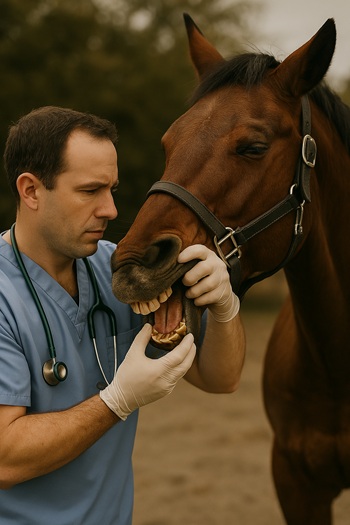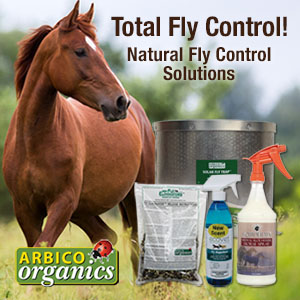
Although equine dentists cannot have their patients lie down in a reclining chair for easy access to those hard-to-reach molars, the field has progressed greatly. It is now possible to perform a root canal or a tooth extraction on a horse, just as in humans. In 1988, the American Veterinary Dental College was formed, allowing veterinarians who have already completed their degree to train further to become a board-certified veterinary dentist.
In contrast to human teeth: most of a horse’s 40 or so teeth are hypsodont, meaning they erupt throughout most of the horse’s life, or up until age 30 or 35 years. Because of this and the fact that horses do more grinding with their teeth than cats and dogs, it is imperative they receive routine dental care. In addition, horse teeth do not neatly line up as do human teeth. Their maxilla, or upper part of their skull, is wider than their mandible. This anatomical arrangement causes horses to form razor sharp points on some of their teeth that can lead to significant problems such as ulcers on their tongue and inside cheek.
Signs owners might see indicating a horse may have a dental problem are large fibers and whole pieces of grain in the horse’s manure; Weight loss; Reaction to the bit; Tilting of the head while eating; Quidding (dropping large clumps of food on the ground while eating). Unlike in the wild, today’s horses spend less time grinding very fibrous substances because many are fed pelleted feeds and softer roughages such as hay. This makes horses much more prone to dental overgrowths and developing points. A point refers to the common problem of sharp edges developing on the cheek side of upper molars and the tongue side of lower molars because horses chew side to side and not up and down as humans do.
To correct this problem, horses need to have their teeth “floated.” To float a horse means to take a rasp, much like a nail file, to shave off some of the overgrown tooth. Every horse should receive a thorough dental exam annually. It might be necessary to have the veterinarian sedate the horse and use a full mouth speculum to examine and palpate each tooth in the horse’s mouth.
Without a speculum, which is the metal device used to keep a horse’s mouth open during a dental exam, a bright light, and sedation, it is impossible to do a complete and safe dental exam. To prevent your horse from developing painful dental conditions have your veterinarian do a thorough oral exam every year.
Provided by Dr. Carol Akers. A service of the University of Illinois College of Agricultural, Consumer and Environmental Sciences.
Related Articles & Free Email Newsletter Sign Up
DIY Nutritional Supplements & Health Care for Horses
Horse Training for Napping Horses
How to Deal with a Horse That has Rolled into a Cast Position




Comment here